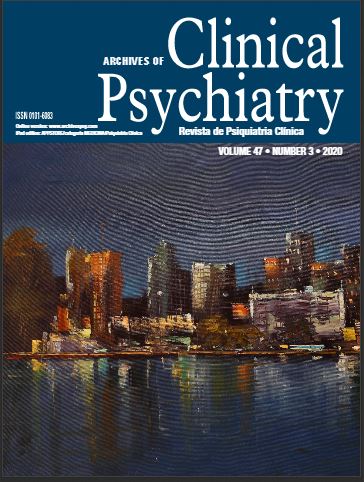Using data from schizophrenia outcome study to estimate the time to treatment outcome and the early-response cut-off score that predicts outcome at week 16
DOI:
https://doi.org/10.1590/0101-60830000000234Keywords:
Time-to-outcome, early-response, cut-off, prediction, schizophreniaAbstract
Background: Being able to make an estimation of the time to clinical outcome, and making predictions early during treatment about the possibility of later response/non-response to treatment, is an important asset that can help to guide treatment strategies and counsel patients and caregivers about treatment expectations. Objectives: The study aimed to determine the time course to treatment outcome and the psychopathological cut-off score at week 4 that predicts outcome at week 16. Methods: This was a naturalistic follow-up study of 160 incident cases of schizophrenia over 16 weeks. Four intervals of follow-up clinical assessments were done. Standard criteria for response and remission were applied. Results: The mean (median) times, in weeks, to response and remission using Brief Psychiatric Rating Scale (BPRS) data were 8.1(8.0); 8.4(8.0); and 10.9 (12.0), respectively. The Areas Under the Curves were high, for response (0.909; 95% C.I., 0.85-0.97) and remission (0.86; 95% C.I., 0.81 -0.94) at week 16. A cut-off score of 20.7% reduction in the total BPRS score at week 4, predicted response status (79.5% sensitivity, 84.2% specificity) and remission status (77.6% sensitivity, 73.3% specificity) at week 16. In addition, a cut-off of 10.21% reduction in the total Scale for Assessment of Negative Symptoms (SANS) score at week 4, predicted response (70.8% sensitivity, 95.5% specificity) at week 16. Discussion: The results are in line with the general clinical impression that, by 2 months, most acutely ill inpatients are fit for discharge; and introduced for further investigation 10.21% reduction in SANS Score as a marker of treatment resistance in schizophrenia.
Downloads
References
Downloads
Published
Issue
Section
License
Once accepted for publication, the manuscript becomes permanent property of the Archives of Clinical Psychiatry. This copyright transfer subsumes exclusive and unlimited entitlement of the Archives of Clinical Psychiatry to publish and distribute the full contents of articles in whichever publishing medium, including press and electronic media, in Brazil and abroad.
Manuscripts are accepted with the understanding that the Editor and the editorial staff have the right to make revisions aimed at greater conciseness, clarity, and conformity with Journal style, of course without changing its content.


